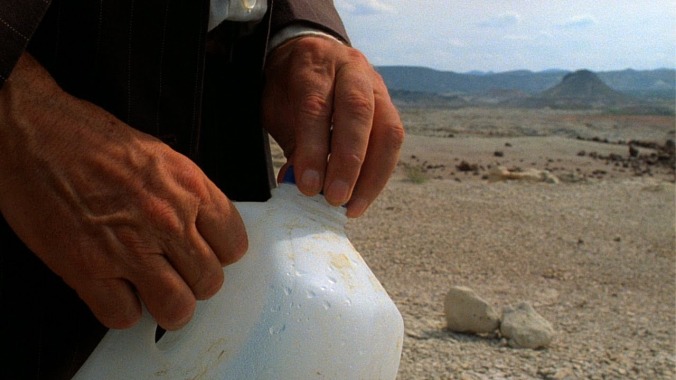R.I.P. Harry Dean Stanton

Harry Dean Stanton, a veteran actor beloved for his hangdog looks and the nuanced humanity with which he filled his performances, has died. According to Variety, Stanton—who had nearly 200 film and television credits to his name—was 91, and died of natural causes.
Born in Kentucky in 1926, Stanton served in the Navy in World War II, before returning to the U.S. to study theater at the University Of Kentucky. At the encouragement of professors, though, he ultimately dropped out of college and made his way to California, where he studied at the famed Pasadena Playhouse. What followed was literal decades of work as a largely unrecognized journeyman TV actor, popping up (sometimes multiple times) on a host of TV Westerns and crime thrillers, including Rawhide, Gunsmoke, and Bonanza.
Although he appeared in a few high-profile or cult films—most notably Alien and Alex Cox’s Repo Man— in the subsequent years, Stanton’s talents were finally employed to their full effect in 1984, when he gave a revelatory turn in Wim Wenders’ Paris, Texas. Wenders—with the help of screenwriter and playwright Sam Shepard—was the first director to fully recognize and harness the actor’s strengths, casting him as a mostly mute, amnesiac man driven by a longing to reconnect with his lost loved ones.
Acting largely without words—at least, until a final monologue into which he pours an entire film’s worth of pent-up emotion and pain—Stanton’s performance drives Paris’ story with wounded looks and occasional flashes of electric warmth. The film won Wenders a BAFTA for best direction and the Palme d’Or at Cannes; it also clued other directors into the untapped reservoir of acting talent hiding in their midst.
In 1990, Stanton began one of his longest professional collaborations, appearing in a small role in David Lynch’s Wild At Heart. The two men would work together five times over their careers, including Twin Peaks: Fire Walk With Me, The Straight Story, and Inland Empire. One of Stanton’s final performances was a reprisal of his FWWM role in the recent Twin Peaks revival series; Lynch remembered his long-time actor fondly today, writing, “There went a great one. There’s nobody like Harry Dean. Everyone loved him. And with good reason. He was a great actor (actually beyond great)—and a great human being—so great to be around him!!! You are really going to be missed Harry Dean!!! Loads of love to you wherever you are now!!!”
Looking back over it, Stanton’s resume is a beautiful mixed bag of genres, budgets, high-brow projects, low-brow projects, and everything in-between, all of them inevitably heightened by his presence. (Roger Ebert, a long-time admirer, once expressed the opinion that “no movie featuring either Harry Dean Stanton or M. Emmet Walsh in a supporting role can be altogether bad.”) Indeed, Stanton is one of those actors where you can just start naming favorite parts and never seem to stop. Poor, doomed Brett from Alien. Cranky, wise, ass-kicking Bud from Repo Man. Boldly defiant Mr. Eckert in Red Dawn. Molly Ringwald’s beaten-down dad in Pretty In Pink. Paul, in Scorsese’s The Last Temptation Of Christ. Polygamous religious leader Roman Grant on Big Love. All of them parts that Stanton infused with a grizzled humanity and taciturn practicality, a solemnity that never quite obscured the kind-heart and vulnerable inner life lurking underneath.